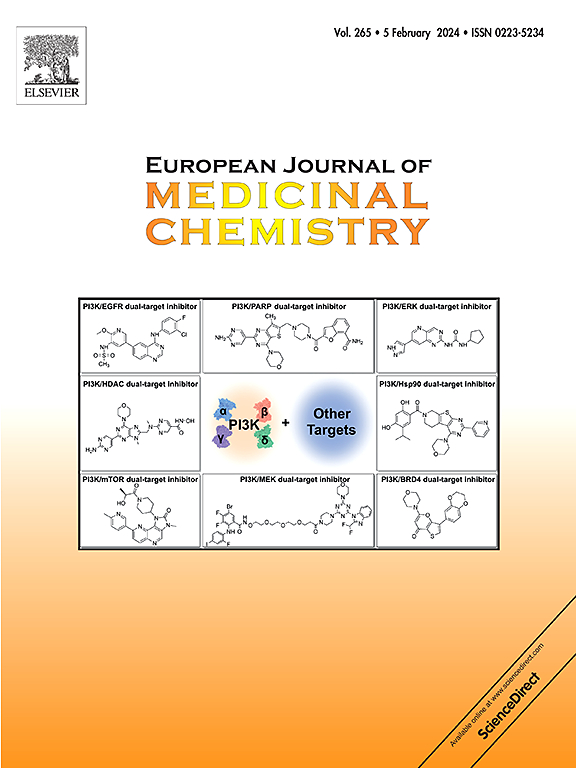Discovery of a deuterated TNF-α small molecule modulator for potential treatment of ulcerative colitis
IF 6
2区 医学
Q1 CHEMISTRY, MEDICINAL
引用次数: 0
Abstract
Tumor necrosis factor-alpha (TNF-α) is an important target for the treatment of inflammatory diseases. Targeting TNF-α inhibition, such as antibody drug infliximab and adalimumab, has emerged as an effective therapeutic strategy for managing the most difficult-to-treat chronic ulcerative colitis (UC). So far, there are no small molecule TNF-α inhibitors available on the market for the treatment of UC. Previously, we reported an indanone analogue (R)-STU104 showed considerable inhibitory activity on TNF-α production in both acute and chronic mouse models of UC with a favorable safety profile. However, further development potential of this compound was greatly limited due to its poor metabolic stability in human liver microsomes and suboptimal pharmacokinetic profiles in mice. Herein, we discovered a deuterated TNF-α small molecule modulator (R)-104-6D-01, which demonstrated promising clinical potential for the treatment of UC. This new compound exhibited enhanced oral bioavailability and exposure in pharmacokinetic studies, as well as superior anti-UC efficacy in a DSS-induced mouse UC model, compared with (R)-STU104 at a dosage of 30 mg/kg/d. Collectively, (R)-104-6D-01 proves to be a promising candidate of potential use in treating UC as an oral TNF-α small molecule modulator.


发现一种氘化TNF-α小分子调节剂可治疗溃疡性结肠炎
肿瘤坏死因子α (Tumor necrosis factor -α, TNF-α)是治疗炎性疾病的重要靶点。靶向TNF-α抑制,如抗体药物英夫利昔单抗和阿达木单抗,已成为管理最难治疗的慢性溃疡性结肠炎(UC)的有效治疗策略。到目前为止,市场上还没有小分子TNF-α抑制剂可用于治疗UC。此前,我们报道了一种吲哚酮类似物(R)-STU104在急性和慢性UC小鼠模型中显示出相当大的TNF-α抑制活性,并具有良好的安全性。然而,由于该化合物在人肝微粒体中的代谢稳定性较差,并且在小鼠体内的药代动力学特征不理想,因此其进一步开发潜力受到很大限制。在此,我们发现了一种氘化的TNF-α小分子调节剂(R)-104-6D-01,它在治疗UC方面具有良好的临床潜力。与剂量为30 mg/kg/d的(R)-STU104相比,该新化合物在dss诱导的小鼠UC模型中表现出更高的口服生物利用度和暴露药代动力学研究,并且具有更好的抗UC效果。综上所述,(R)-104-6D-01作为口服TNF-α小分子调节剂在UC治疗中具有潜在的应用前景。
本文章由计算机程序翻译,如有差异,请以英文原文为准。
求助全文
约1分钟内获得全文
求助全文
来源期刊
CiteScore
11.70
自引率
9.00%
发文量
863
审稿时长
29 days
期刊介绍:
The European Journal of Medicinal Chemistry is a global journal that publishes studies on all aspects of medicinal chemistry. It provides a medium for publication of original papers and also welcomes critical review papers.
A typical paper would report on the organic synthesis, characterization and pharmacological evaluation of compounds. Other topics of interest are drug design, QSAR, molecular modeling, drug-receptor interactions, molecular aspects of drug metabolism, prodrug synthesis and drug targeting. The journal expects manuscripts to present the rational for a study, provide insight into the design of compounds or understanding of mechanism, or clarify the targets.

 求助内容:
求助内容: 应助结果提醒方式:
应助结果提醒方式:


